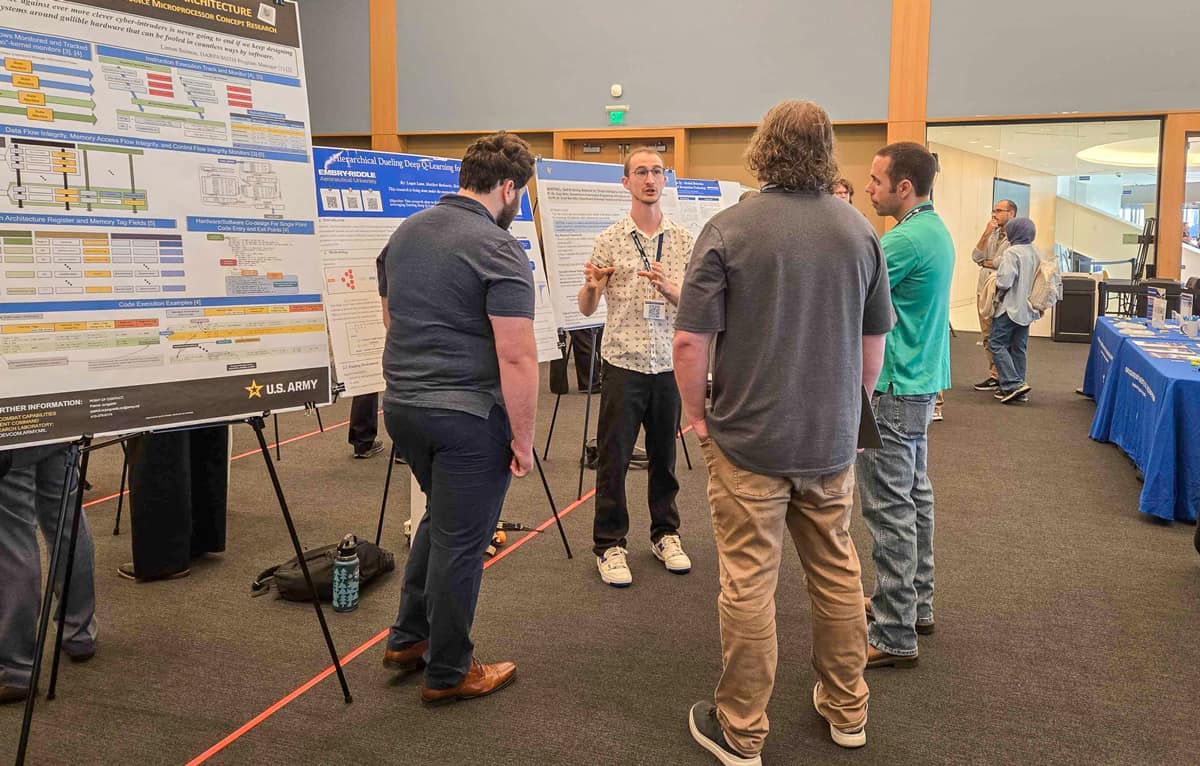Embry-Riddle Undergrads Develop ‘Guard Dog’ System to Ward Off Cyberattacks

Three Embry-Riddle undergraduates won a first-place award at the IEEE SoutheastCon for a machine-learning system that can thwart ever-evolving attacks on computer networks.
“Think of our system as training a guard dog,” said Logan Luna, a rising senior in Electrical Engineering and Computer Science (EECS). “Rather than teaching it to recognize every possible intruder, we reward it for making the right decisions when it senses a threat. Over time, it learns what’s dangerous, even if it hasn’t seen it before.”
The research team — which included Luna and Electrical Engineering and Computer Science classmates Matthew Berkowitz and Sirio Jansen-Sánchez — used a kind of AI called dueling deep Q-learning. The technology allows a system to make decisions within a framework of how important each decision is, Luna said. The students also employed a technology called explainable AI to make the workings of the system more transparent.
“Traditional systems only know how to stop attacks they’ve seen before and can have difficulty adapting to unknown threats. Our model learns to adapt independently, which is critical as cyberattacks become more sophisticated,” Luna said.
He added that employing explainable AI makes the system more practical. “By making the AI’s decisions interpretable, we help security analysts trust and understand the system better,” Luna said.
The team’s paper was selected from among 250 that were accepted to the conference. Among five finalists who presented their research to a panel of judges, the Embry-Riddle team was awarded the 2025 IEEE-HKN Best Paper Award.
Dr. Jim Gregory, dean of the College of Engineering, complimented the team on their project.
“The students have developed their project to a very high level, resulting in an award-winning conference paper,” Gregory said. “This is a great example of the impactful work that Embry-Riddle students take on.”
The team was mentored by Dr. Laxima Niure Kandel, assistant professor in the Department of Electrical Engineering and Computer Science.
Kandel said such student research makes gains in the fight against increasingly sophisticated AI-powered risks to cybersecurity by using equally sophisticated and adaptable AI defense systems.
“AI's impact on cybersecurity is a double-edged sword. It empowers both attackers (automating attacks, identifying vulnerabilities) and defenders (threat detection, proactive countermeasures),” said Kandel. “To stay one step ahead, it is essential to develop AI agents capable of detecting both known and emerging (unknown) attacks. The sandbox environment being built by students plays a vital role in generating diverse attack data, which is key to training such adaptable AI systems.”
Berkowitz and Luna started the research in a class with Kandel. They recruited Jansen-Sánchez because he had experience building complex cyber environments, Luna said.
Jansen-Sánchez, also a rising senior, gained such experience primarily from working as an intern at Comtech Telecommunications in Massachusetts, which provides 911 services through a technology designed for secure emergency communications.
“I learned how to troubleshoot network connectivity issues and integrate solutions to allow for continuous and secure operations,” Jansen-Sánchez said, explaining that this knowledge helped him to “apply my insight into not just the creation of the environment, which we are developing for training, but also into the parameters that our model uses to ensure it is making responsible decisions based on the correct data.”
Kandel said the team’s research is advanced for undergraduates, referring to it as work usually performed by master’s or Ph.D. students.
Their paper was published in IEEE Explore.

 Michaela Jarvis
Michaela Jarvis